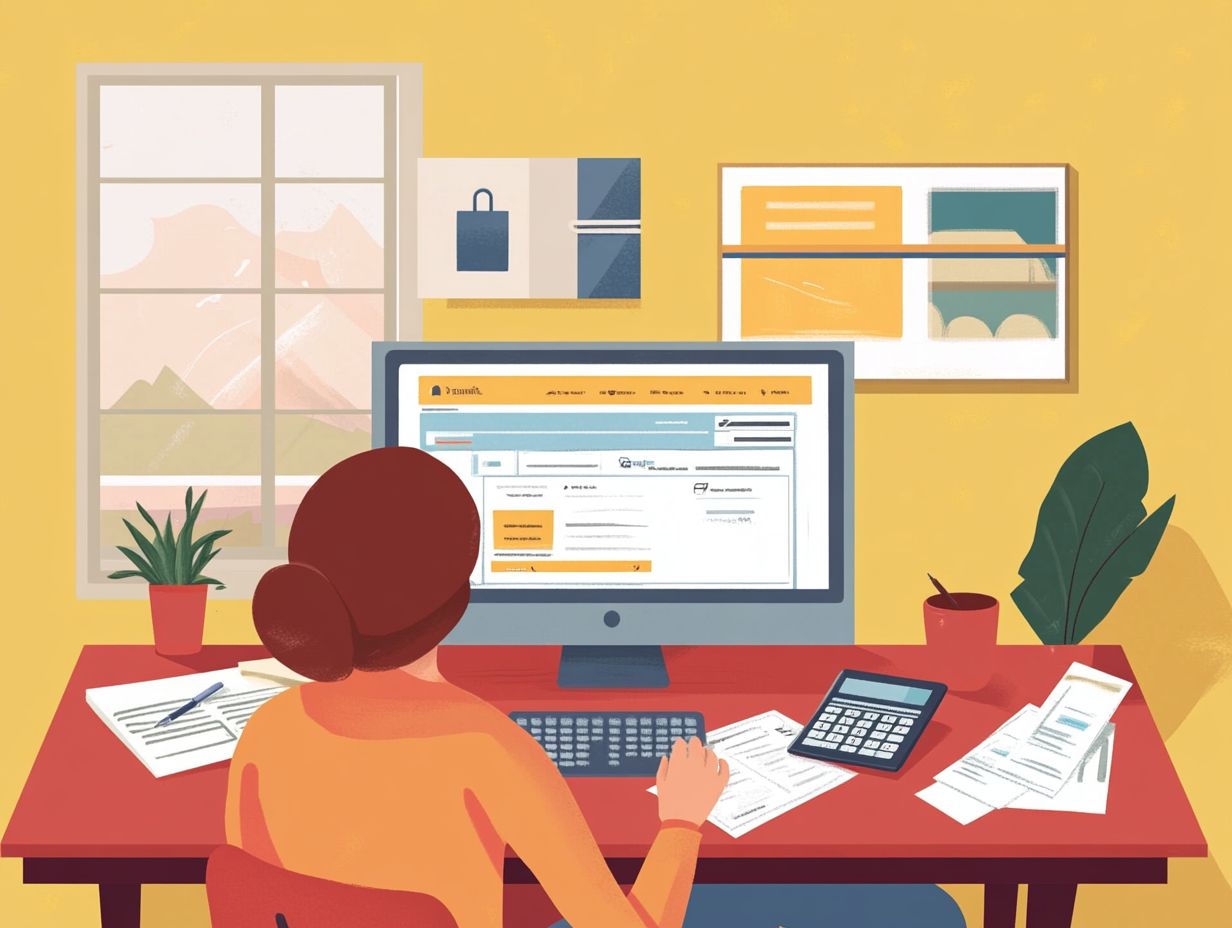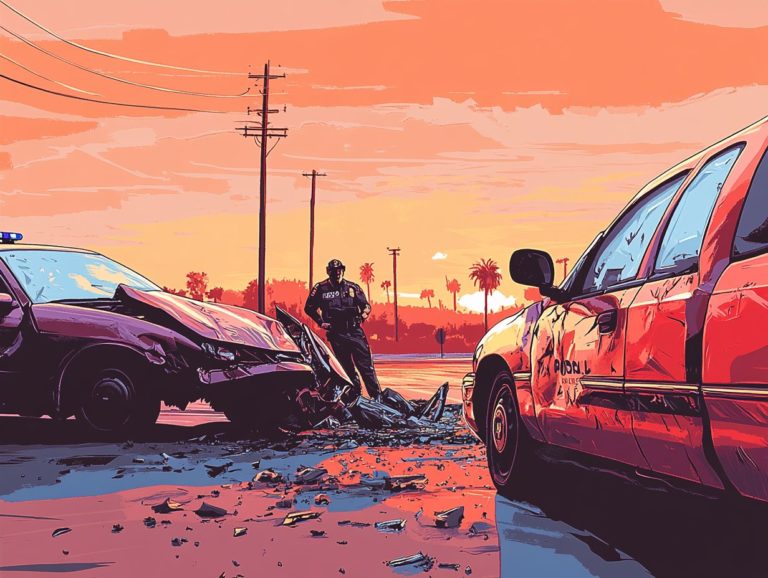How to Cancel Your Auto Insurance Policy?
Navigating the world of auto insurance can feel like a maze. There may come a time when you need to cancel your policy.
Whether you’re facing financial challenges, considering a switch to a different provider, or no longer require coverage, it’s essential to understand the cancellation process.
This article will explain what auto insurance cancellation involves, explore common reasons for cancellation, and guide you through the steps for a smooth transition.
We’ll also discuss important considerations and alternatives to cancellation, helping you make a choice that fits your needs.
Contents
- Key Takeaways:
- Understanding Auto Insurance Cancellation
- Reasons for Cancelling Auto Insurance
- Steps to Cancel Your Auto Insurance Policy
- Considerations Before Canceling
- Explore Your Options Before Canceling
- Frequently Asked Questions
- How do I cancel my auto insurance policy?
- Do I need a reason to cancel my auto insurance policy?
- Can I cancel my auto insurance policy at any time?
- Will I receive a refund if I cancel my auto insurance policy?
- What should I do with my insurance documents after canceling my auto insurance policy?
- Can I cancel my auto insurance policy if I still have a loan on my vehicle?
Key Takeaways:

- Canceling your auto insurance policy means terminating your coverage, which can impact your driving record and future insurance rates.
- Common reasons for cancellation include finding a better deal, selling your car, or no longer needing a vehicle.
- Before canceling, gather all necessary information, notify your provider, and return any insurance documents. Consider adjusting your policy instead to avoid potential consequences.
Understanding Auto Insurance Cancellation
Understanding auto insurance cancellation is vital for you as a policyholder, especially if you’re considering a change in coverage due to relocating, dissatisfaction with your insurer, or looking for better prices.
The cancellation process involves notifying your insurance provider, which may include a cancellation fee. Make sure you have proof of insurance from a new provider to prevent any coverage gaps.
It’s crucial to know how this decision could affect your future premiums and claims.
What is Auto Insurance Cancellation?
You can cancel your auto insurance policy, which can be initiated by either you or the insurance company. Typically, a formal cancellation notice is needed to start the process.
This cancellation can take different forms, mainly categorized as voluntary or involuntary. Voluntary cancellations happen when you decide to end the policy perhaps your insurance needs have changed, or you’ve found a better price elsewhere. Involuntary cancellations are initiated by the insurance company, often due to not paying your insurance fees or significant increases in risk associated with your vehicle.
Each type of cancellation has its own terms and conditions, which can impact your future premiums and coverage options. For example, a voluntary cancellation might not affect your future premiums as much as an involuntary one, which could lead to higher rates or difficulties in securing coverage later on. This dynamic affects both your responsibilities as a policyholder and those of the insurer.
Reasons for Cancelling Auto Insurance
There are various reasons you might consider canceling your car insurance. Perhaps you’re looking for better coverage options that suit your needs, frustrated with rising premiums, or need to adjust your policy due to a move to a new state with different minimum coverage requirements.
Each of these factors can significantly influence your decision, ensuring your insurance aligns with your evolving circumstances and preferences.
Common Reasons for Cancellation
You may find yourself canceling auto insurance for several common reasons. These reasons can include rising premiums, insufficient liability coverage, or the need to prevent a coverage gap during a policy switch.
If you re facing escalating premiums that stretch your budget thin, it s tempting to look for more affordable options elsewhere. However, this drastic choice could lead you to unknowingly drive without insurance, exposing you to significant financial risks if an accident occurs.
If you discover that your liability coverage isn t quite up to par, you might feel the urgent need to cancel rather than risk the consequences of a financially devastating claim. Imagine being involved in a minor accident, but your coverage falls short you could end up shouldering substantial damages, leading to severe long-term financial repercussions.
Proper planning is essential. A sudden lapse in coverage during a policy transition can create gaps that leave you vulnerable to unexpected incidents.
In essence, understanding these factors is key to making informed decisions about your auto insurance. This ensures you maintain adequate protection and financial stability.
Steps to Cancel Your Auto Insurance Policy

To successfully cancel your auto insurance policy, it’s vital to follow a clear cancellation process. This includes gathering necessary information, notifying your insurance provider in a timely manner, and learning how to switch auto insurance providers to secure proof of insurance from your new provider.
Taking these steps will help you avoid any coverage gaps and make the transition smooth.
Gathering Necessary Information
Before you decide to cancel your auto insurance, gather all the necessary information. This includes your current insurance policy details, any relevant cancellation notices, and proof of insurance from your new provider.
This preparation will help ensure a seamless transition, preventing any lapses in coverage that could leave you exposed. Additionally, your previous claims history may also be required to provide context for your cancellation. Insurers often ask for evidence of prior claims to validate your current status.
To initiate the cancellation process effectively, ensure you have paperwork indicating your new policy’s effective date. This serves as a safeguard against gaps in liability coverage, ensuring you remain protected even during the switch.
Notifying Your Insurance Provider
Notifying your insurance provider about your intention to cancel requires a written notice that you want to cancel. Your insurance agent can often help facilitate this, ensuring clarity and adherence to the policy cancellation process.
Along with submitting the notice, it s essential for you, as the policyholder, to follow up and obtain written confirmation of the cancellation. This helps prevent any potential disputes in the future. This confirmation acts as a protective measure, affirming that your policy has indeed been terminated.
Review the terms of your policy regarding any cancellation fees that may apply. These charges can vary significantly between providers. Understanding these fees in advance helps you plan your finances better and ensures you won t be caught off guard during this transitional process.
Returning Your Insurance Documents
Returning your insurance documents to the provider is a crucial step in the policy cancellation process. This not only confirms the termination of your coverage but may also impact any potential refund you might be entitled to.
Handle these documents with care; missing or incorrectly submitted paperwork can lead to significant delays in receiving your refund. Each insurance provider may have specific requirements for how you should return physical documentation, including the format and submission method. Follow these guidelines carefully to make your cancellation process quick and easy!
Understanding the expected timeline for receiving your refund can help you manage your expectations and reduce unnecessary stress. Generally, this process can take anywhere from a few weeks to a couple of months, depending on the company s procedures and the complexity of your cancellation.
Considerations Before Canceling
Before you decide to cancel your auto insurance, take a moment to reflect on the potential consequences. Driving uninsured can expose you to significant risks. A coverage gap might come back to haunt you.
These decisions can impact your future auto insurance rates. It’s essential to weigh these factors carefully before making your choice.
Impact on Your Driving Record and Future Rates

Cancelling your auto insurance can have a significant impact on your driving record. Any lapses in liability coverage might lead to higher auto insurance rates in the future.
It could also create potential hurdles with insurance companies when you seek new coverage. Insurance providers often evaluate risk based on your driving history, including any gaps in your insurance coverage.
If you let your policy lapse, it sends a signal to insurers that you’re a higher risk. This could mean increased premiums when you decide to reapply.
This heightened scrutiny can complicate your efforts to secure new insurance. Companies may view your driving record with a degree of skepticism.
Therefore, maintaining continuous coverage protects you from legal repercussions and helps keep your rates low.
Explore Your Options Before Canceling
Before deciding to cancel your auto insurance, take a moment to explore alternatives. Look for options that could enable you to switch insurance providers or adjust your current coverage. Customize your policy to better fit your needs while maintaining essential protection.
Options for Adjusting Your Policy
You have various options for adjusting your auto insurance policy. Consider modifying coverage limits or adding new coverage options. Explore discounts that could help offset rising premiums.
By collaborating with knowledgeable insurance agents, you can personalize your coverage to meet your unique needs and circumstances. These professionals offer invaluable insights into options that may align more closely with your current financial situation or lifestyle changes.
Instead of considering cancellation, having an open dialogue with an agent allows you to take a proactive approach. This not only maintains essential protection but also uncovers potential savings.
By doing so, you can keep the necessary coverage while making strategic adjustments. Ensure you receive maximum value without any unnecessary gaps in protection.
Frequently Asked Questions
How do I cancel my auto insurance policy?
Canceling your auto insurance policy is a simple process. However, before you do so, it’s important to know how to update your auto insurance policy if your circumstances change. You can either call your insurance provider or submit a written request to cancel your policy.
Make sure to have your policy number and personal information ready when contacting your provider.
Do I need a reason to cancel my auto insurance policy?

No, you do not need a reason to cancel your auto insurance policy. Don’t forget that you may be subject to fees or penalties for canceling your policy before the end of your contract.
Can I cancel my auto insurance policy at any time?
Yes, you can cancel your auto insurance policy at any time. However, if you cancel before the end of your contract, you may face fees or penalties.
It’s best to review your policy contract or speak with your insurance provider to understand the cancellation terms.
Will I receive a refund if I cancel my auto insurance policy?
Yes, you may be eligible for a refund if you have paid for your policy in advance. Your insurance provider will prorate your refund based on the length of time left on your policy contract.
Make sure to review your contract or contact your provider for more information.
What should I do with my insurance documents after canceling my auto insurance policy?
After canceling your auto insurance policy, it is important to keep your insurance documents in a safe place for future reference. You may need these documents for proof of insurance or if you decide to get insurance with a different provider.
Can I cancel my auto insurance policy if I still have a loan on my vehicle?
Yes, you can cancel your auto insurance policy even if you have a loan on your vehicle. Just remember, your lender likely requires you to keep insurance until the loan is fully paid.
Before you cancel, check with your lender to avoid any surprises. Keeping your vehicle protected is important!






